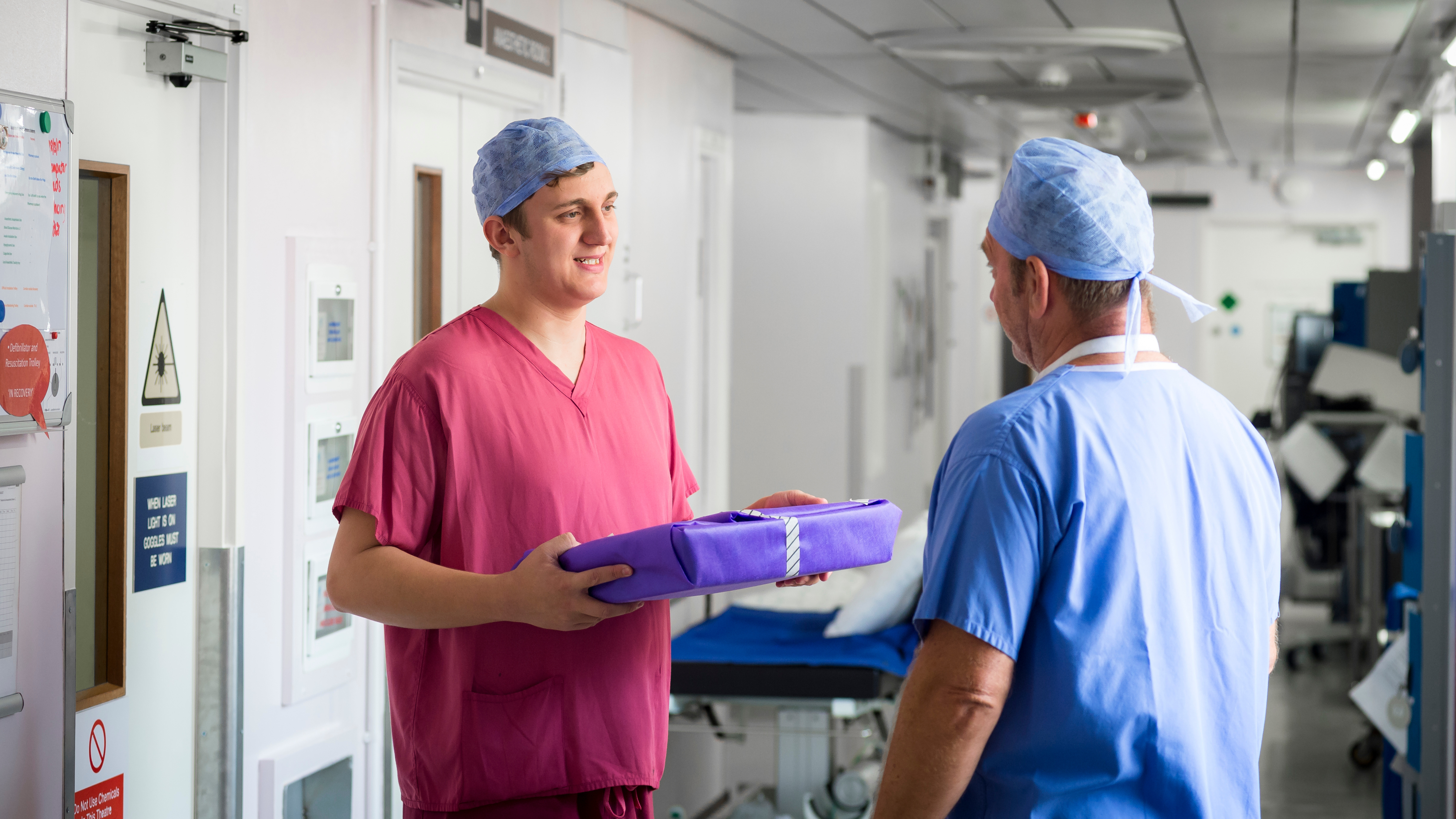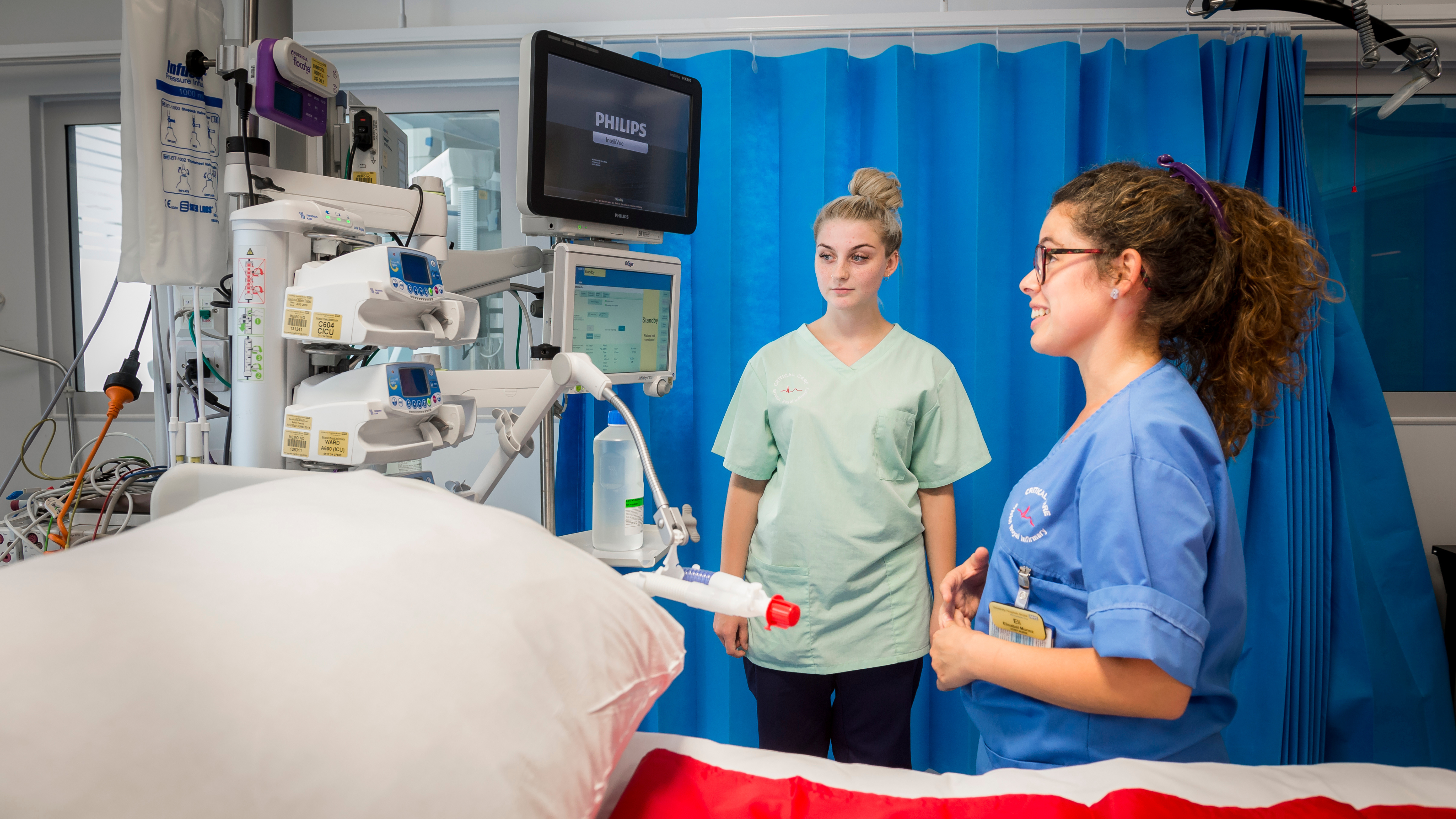Become a Registered Nurse at UHBW
On this page you will find more information about the Registered Nurse Degree Apprenticeship (RNDA) programme, what it is, what you need to do to apply and links to useful information which can help you decide whether this role is right for you.
Prefer to speak to someone? Please email our Talent Acquisition Team on talent@uhbw.nhs.uk
What is the Registered Nurse Degree Apprenticeship?
Nursing is a vast field with many areas of specialism and scope for career progression. Working as a nursing professional you will need to manage complex, sensitive and often pressured situations. You are in a position where compassion, trust and expertise are essential as you care for service users in a wide number of circumstances and with differing needs.
Through the Registered Nurse Degree Apprenticeship (RNDA) you will become capable and competent in meeting the key care needs of all patient groups. You will appreciate each field of nursing practice and develop exceptional skills so you can meet the co-existing nursing and healthcare needs of service users. As you will learn whilst gaining hands-on experience you will be able to put your studies into practice immediately. You will see how your skills translate into the workplace, benefitting the service users, their families and your colleagues.
On completion, you will become a professional, responsible and self-aware nursing graduate with care and compassion complemented by the ability to think quickly and critically. There will also be opportunities for you to take a lead in healthcare developments through your commitment and outstanding communication skills.
Typical job roles for individuals studying this programme include Staff Nurse, Sister/Charge Nurse and Clinical Educator.
Aim of the apprenticeship:
The aim of the Registered Nurse Degree Apprenticeship (RNDA) is to offer an alternative route to obtain a nursing degree and to support progression of those who have already completed Nursing Associate or Assistant Practitioner programmes and who would like to continue to study to obtain a nursing degree. By opening up new routes to become a Registered Nurse, this helps increase the capacity and capability of the nursing workforce by ensuring that the right person with the right level of skills and education is delivering the right care to the patient.
What are the core requirements of the programme?
All RNDA programmes are approved by the NMC as meeting their education standards for pre-registration nursing programmes. All RNDA’s must meet the following:
- To evidence overall 4600 hours of learning, divided equally between 50% (2300 hours theory) and (2300 hours in practice), over the duration of the programme.
- Supernumerary practice hours will be undertaken as part of the apprenticeship – the standards expect experience of all four fields of nursing – adult, mental health, child and learning disabilities, but do not expect learners to have specific placements.
- To include practice learning opportunities to a diverse range of people, across the lifespan and in a variety of settings across all four fields of nursing – adult, mental health, child and learning disabilities.
- The Registered Nurse Degree Apprentice will need a practice assessor and practice supervisor to support them throughout their apprenticeship. The practice assessor will need to be an NMC registered practitioner and have experience in the student’s specific field of practice, whereas the practice supervisor can be any registered Health and social care professional
What will you learn?
- How to work in a range of care settings
- Working effectively within a multidisciplinary team
- Complex care needs
- Assessment, planning, implementation and evaluating care
- Medicines management
- Effective communication in a range of situations
Commitment from you
You will study at Levels 4, 5, 6, and will be required to complete 25 hours of either theory or practice per week. Each Level is completed over 69 weeks and this includes 7 weeks of annual leave.
During this programme, 60% of your contracted working hours will be spent on learning and developing the required Knowledge, Skills and Behaviours.
This development time will include learning new relevant tasks in your role, embedding your knowledge in your role, practical workplace training, spending development time with your Practice Supervisor and/or Practice Assessor, attending online or face-to-face courses and time spent writing assignments/assessments or directed self-study hours:
- BSc (Hons) Nursing Degree work
- Evidencing the application of your knowledge to practice
- Independent study and research
- Supervised by Practice Supervisors and Practice Assessors
- Clinical Skills training
Our Roles
The Registered Nurse Degree Apprenticeship Programme
The programme addresses the requirements of the NMC (2018) Standards for Pre-Registration Nursing Education and incorporates guidance from BPPU’s Principles and Guidance for programme Design and General Requirements Policy.
It provides a Two-year, integrated and core programme consisting of adult, child, or mental health fields of practice, generic and practice learning modules, beginning at level 4 through to level 6.
The programme provides you with parity of apprentices’ experience across the distinct fields of practice, whilst offering you apprentice flexibility where and as appropriate.
It complies with the NMC requirement of 50% theory and 50% practice overall. Simulated learning opportunities will exist within your programme to facilitate the acquisition of core professional knowledge skills and attributes necessary for contemporary nursing practice.
The programme is designed with generic and field of practice modules that will provide you with an opportunity for shared learning with apprentices from the other fields of nursing practice. Field of practice modules concentrate on facilitating learning with apprentices from the adult, child, or mental health fields of nursing practice.
The Nursing programme also provides you with an opportunity to actively engage with service users and their families, during practice-based learning modules, but also as part of the learning, teaching and assessment of your programme.
The programme promotes a spiral curriculum applying the seven platforms of the NMC (2018) throughout the programme in all modules of study.
- Platform 1: Being an accountable professional;
- Platform 2: Promoting health and preventing ill health;
- Platform 3: Assessing needs and planning care;
- Platform 4: Providing and evaluating care;
- Platform 5: Leading and managing nursing care and working in teams;
- Platform 6: Improving safety and quality of care and;
- Platform 7: Coordinating care.
These platforms are developed across the programme, progressing from broad, generic, essential content to complex, in depth and increasingly adult, child, or mental health field-specific content. This will permit you to acquire the fundamental knowledge and skills expected to address the essential health needs of all patient groups, while ensuring you progress the specific in-depth knowledge and skills to address the complex health needs of individuals from the adult, child, or mental health fields of nursing practice.
The programme aims to create an inclusive, challenging and transformational learning experience. An apprentice focused approach is adopted with a positive, supportive transformative learning experience. The School will motivate and support you academically, pastorally and professionally.
In the initial stages of the programme you are given more direction and assistance to empower you to move from the notion of a learner who is dependent to one who becomes autonomous in order to become increasingly reflective and critical as the programme and your knowledge develops. There is an expectation that as you progress with your studies you become independent and self-directed, taking increasing responsibility for your own learning and professional development.
Click the videos below to learn about nursing at UHBW!
-
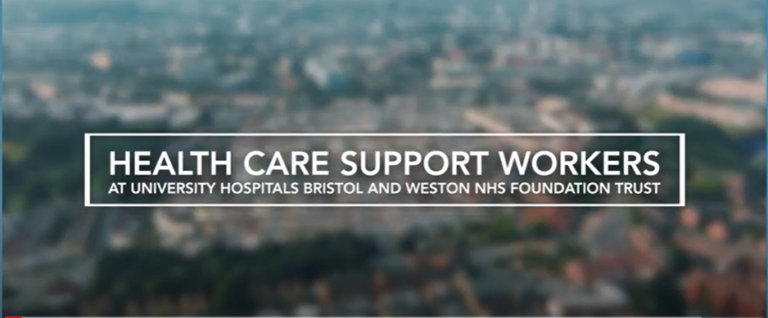 Healthcare Support Workers at UHBW
Healthcare Support Workers at UHBW -
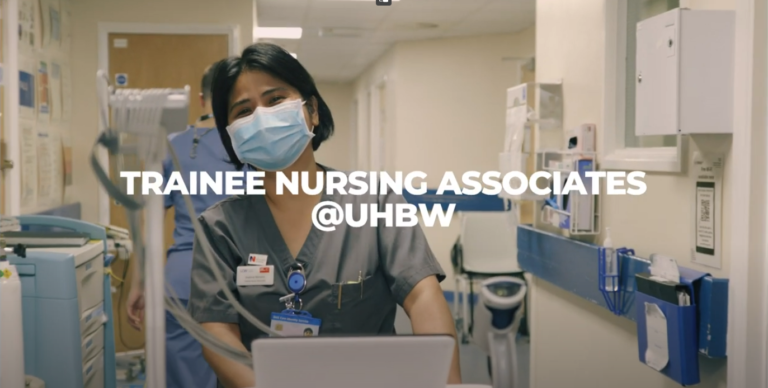 Trainee Nursing Assoicate
Trainee Nursing Assoicate -
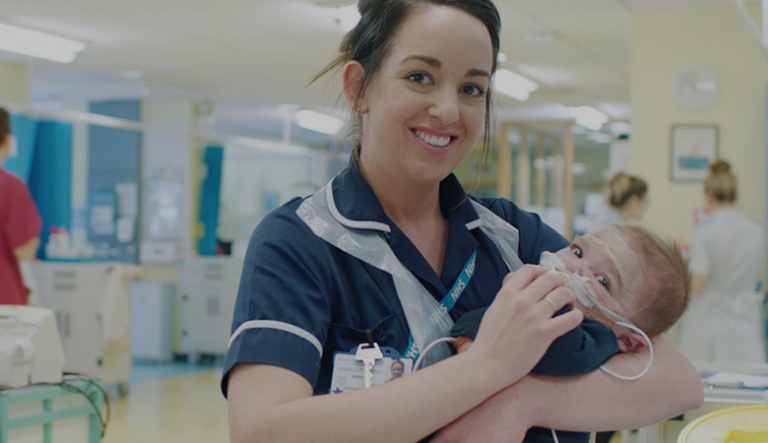 Children’s Nurse
Children’s Nurse -
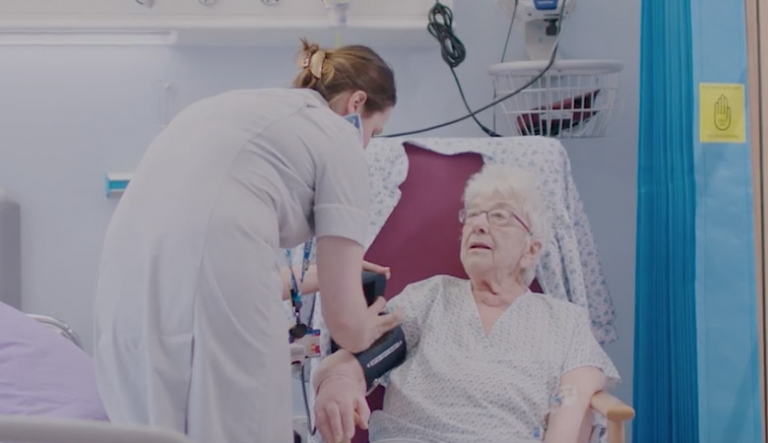 Adult Nurse
Adult Nurse -
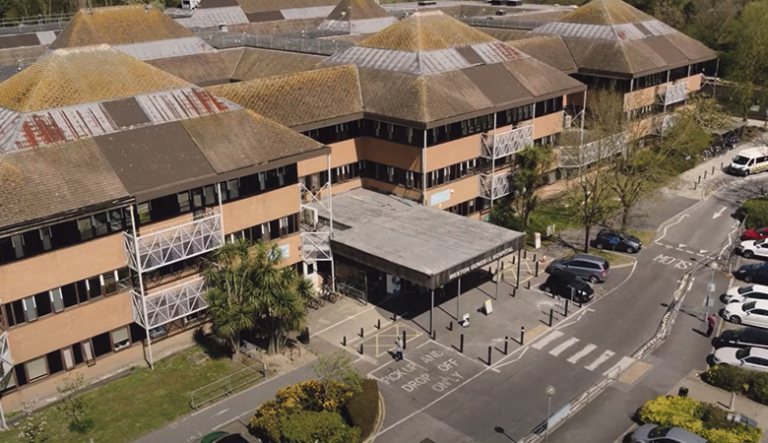 Adult Nurse – Weston
Adult Nurse – Weston
Top Application Tips
Top Tips when applying for a RNDA Role
The RNDA role is a fantastic opportunity to progress to a registered nursing role; however you should not underestimate the work and commitment required. As a RNDA you will effectively be working in a full time role and completing a foundation degree in nursing within two – four years. If you are interested in becoming a RNDA now or in the future, speak to your manager, or contact the Talent Team for further information.
This section should give you some useful hints and tips on completing the application form to give you the best chance of getting an invite to the assessment centre.
Completing the TRAC application from
To apply for a RNDA role you will need to complete a TRAC application form as instructed in the advert. The application form is lengthy, but you need to make sure you spend time to complete it with as much information as possible.
The RNDA recruitment process is competitive with high numbers of applicants and the selection process is anonymous. The shortlister does not see your personal details so it is important that you provide all the relevant details in the application form.
First impressions count, don’t assume you will get an interview.
The application form is the first stage of the application process and will help us understand you, your current skill set and your academic achievements. As a potential RNDA apprentice it is important to remember that you will be studying for a foundation degree in nursing.
Completing the following sections on the TRAC application form will ensure that we get the information we need to understand your suitability for the role. Please pay particular attention to the following sections of the form:
Education & Professional Qualifications
You should provide a complete list of all of your qualifications. So as proceed to shortlisting it is essential that have the required qualifications, full details of the essential qualifications are on the Person Specification.
Relevant Training Courses Attended
As an experienced and competent healthcare support worker you should have attended a number of training courses. Please list these courses, to provide evidence of your competency within your current role and continuing professional development.
Current/most recent employer & Previous employer
To ensure we get all the information we need and to understand your suitability for the role you will need to provide a full work history. This should include your current employer, the types of patients you have looked after and any additional initiatives or projects you may have been involved in the clinical area.
You may have worked in non-clinical roles in the past, and it is important that you also include these roles. There are many skills, gained in a previous role that are transferable to a healthcare setting, be sure to state them in your application form.
Supporting Information
This section is essential, and an ideal opportunity for you to explain why you are an ideal candidate for the RNDA role. Before completing this section it is really important that you have read the Job Description (JD) and Person Specification (PS) in detail.
Your application is scored based on quality and detail you provide to match the requirements stated in the JD & PS. Most importantly you should demonstrate a good understand of the RNDA role and that of the Registered Nurse.
We will also be using this section to assess your communication skills, and you should take time to complete this section in a well thought out, detailed and concise manner.
Once you have completed your application make sure you check it thoroughly. Incorrect spelling, badly structured sentences and lack of relevant detail is not going to result in a quality application. Make sure that your application is not too long; don’t include information that is irrelevant or repetitive.
Next Steps
Your application form will be forwarded for shortlisting when the advert closes. All personal information is removed and each application is identified by a unique number. The shortlister evaluates each application, using scoring a criteria which is based on the Person Specification. If there are large number of applicants this process may take a week or two to complete.
Applications must achieve a minimum score to be invited to the assessment the day and interview. Candidates will be informed of the outcome via the TRAC e-mail system.
Successful candidates will be required to provide evidence of their academic qualifications, please ensure that you have the original certificates.
Shortlisted candidates will be invited to full day assessment centre as detailed in the job advert. This day will include a mix group based activities and a formal interview by panel. The day is run in collaboration with the education provider responsible for the academic aspect of the apprenticeship.
How to Apply
Assessment Centre
If successful at application stage, you will be invited to an assessment centre.
Similar to an interview, you will join a group of other applicants, to perform tasks and activities that test your suitability for the job. You will also be tested on your understanding of the role, our values and behaviours.
Final interview
Candidates who are successful in the assessment centre, will be invited for a final interview in the afternoon.
Starting date
The start date for the programme aligns with the course providers start dates.
Click here to register your interest in the Registered Nurse Degree Apprenticeship
What band will I get paid as a Registered Nurse Degree Apprentice?
| Two Year Accelerated RNDA –
You will be paid Band 4 across the two year programme Four Year Full Course RNDA – You will be paid band 3 for the first and second year of the course, then if successfully achieved you will be paid band 4 for the third and forth year of the programme. |
Can I choose which university I attend?
No, the Trust has strong working partnerships with local universities who support you through your training; you will be allocated a University. Each University has been partnered with each Health Care Organisation
Who will pay for the cost of my training?
Your University fees for the programme will be paid via the apprenticeship levy.
I haven’t studied for a long time, what level of study skills support will I receive from the university?
RNDA’s will be provided with support throughout their studies. This will include a Clinical Educator/ Personal Tutor who will be able to support you throughout the programme. The Universities also have comprehensive wellbeing services to support you.
How much time will I be at university and will I go on placements?
Clinical placements will include community or paediatric settings in order to gain a broad nursing knowledge. The clinical placements are likely to be in week blocks, though this is currently under review by the Trust. It is essential that you can be flexible with regard to shifts in order to fit in with the requirements of the different placements you will be required to complete.
How will I be supported during clinical placements?
You will be supported in Practice by a Practice Assessor, Practice Supervisors, your line manager on your host ward and the Practice Placement & Development Team.
When will I be able to take my holidays?
There is some flexibility with holiday requests and this should be arranged with your line manager as normal but should take into account University days and clinical placements.
How many hours of study will I be expected to undertake in my own time?
You will be expected to spend a proportion of your time outside of your rostered working hours and attending the University to undertake additional study to support the achievement of your learning outcomes. This would normally require an additional 5 to 15 hours of study per week although this will vary from person to person. You will be expected to prioritise and manage your own workload to meet the demands of academic study.
What happens after I qualify at the end of the programme?
You will be eligible to apply for Registered Nurse jobs after you have received your NMC registration which will be at Band 5 (Agenda for Change).





